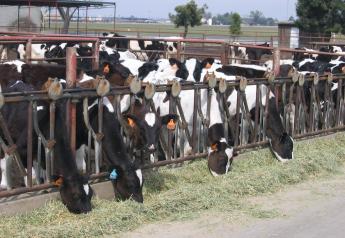Evening Report | September 19, 2023

Check our advice monitor on ProFarmer.com for updates to our marketing plan.
Conab expects another record Brazilian soybean crop, smaller corn production in 2023-24... Brazilian crop estimating agency Conab in its first forecast for 2023-24 expects the country to produce a soybean crop of 162.4 MMT, which would be up 5.1% from this year’s record production. Conab forecasts a 2.8% increase in planted soybean area.
Conab expects Brazil’s corn crop to decline 9.1% from this year’s record to 119.8 MMT, fueled by a projected 4.8% drop in planted area.
Aussie weather bureau declares El Niño is fully established... The Australian Bureau of Meteorology says atmospheric and oceanic conditions signal an El Niño pattern is fully established. Confirmation of an established El Niño increases the likelihood the event will be sustained through Australia’s summer (northern hemisphere winter).
The bureau said, “Overall, there are signs that the atmosphere is responding to the pattern of SSTs [sea surface temperatures] in the tropical Pacific and coupling of the ocean and atmosphere has started to occur. This coupling is a characteristic of an El Niño event and is what strengthens and sustains an event for an extended period. Climate models indicate this El Niño is likely to persist until at least the end of February. El Niño typically leads to reduced spring and early summer rainfall for eastern Australia, and warmer days for the southern two-thirds of the country.”
A positive Indian Ocean Dipole (IOD) is also underway. The bureau said, “When a positive IOD and El Niño occur together, their drying effect is typically stronger and more widespread across Australia.”
NCGA challenges EPA’s conclusions on ethanol’s climate benefits... The National Corn Growers Association (NCGA) expressed criticism of a draft report from EPA’s Science Advisory Board (SAB), which questions whether increasing ethanol usage can significantly reduce greenhouse gas (GHG) emissions versus gasoline or diesel. The draft report, slated for discussion at SAB’s upcoming meeting, calls on EPA to carefully examine the scientific evidence surrounding claims that corn ethanol offers lower lifecycle GHG emissions than petroleum-based fuels.
The draft report states that determining whether corn starch ethanol use reduces GHG emissions relative to gasoline and diesel is crucial in assessing the Renewable Fuel Standard’s (RFS) impact on climate. It suggests there is a reasonable chance that substituting corn ethanol for gasoline or diesel may result in minimal or no climate benefits, prompting SAB to recommend further research into the role of the RFS in reducing GHG emissions.
The report highlights the need for additional scientific research, particularly on issues related to land use, such as the impact of increased ethanol demand due to the RFS on cropland expansion versus corn production. It also emphasizes the necessity of studying the water and climate consequences of nitrous oxide emissions from fertilizers used in corn cultivation.
The draft report suggests that offering incentives for corn ethanol based on the cultivation and processing methods of the corn feedstock could reduce uncertainty regarding ethanol’s lifecycle GHG emissions. It encourages EPA to explore the feasibility of providing incentives to ethanol producers using carbon capture technology and adopting climate-smart agricultural practices for corn feedstock.
In response, NCGA criticized the report’s conclusions, citing research supporting their assertion that corn ethanol has significantly lower lifecycle GHG emissions compared to petroleum-based fuels. The NCGA cited studies, including research from the Department of Energy’s Argonne National Laboratory and academic research, which showed substantial GHG emission reductions from corn ethanol.
NCGA CEO, Neil Caskey, expressed concern over the SAB report in a letter to EPA Administrator Michael Regan, highlighting the multitude of studies confirming the environmental benefits of corn ethanol. Caskey also challenged the report’s claims regarding land use, emphasizing the consistent productivity improvements in corn farming, which have led to higher yields using less land. Caskey argued that any measures hampering ethanol usage could complicate President Biden’s climate goals, which are likely to require biofuels like corn ethanol for success. He urged EPA to consider the extensive research and scientific evidence supporting ethanol’s environmental benefits before taking further actions related to this biofuel. Caskey is set to deliver verbal remarks to SAB during its upcoming meeting.
Prop 12 triggers pork price surge and supply disruptions... California’s Proposition 12, imposing stringent pork production standards, went into effect on July 1, 2023, causing significant price increases and supply chain disruptions in the state, according to a recent review by Southern Ag Today. The law mandates that uncooked pork sold in California must come from sows kept in pens with at least 24 square feet of space, impacting producers and processors from major hog-producing states.
While a Sacramento County court order allowed non-compliant pork in the supply chain before July 1 to continue being sold in California until Dec. 31, early data from Circana retail-level scanners indicate signs of strain in California’s pork market, the article notes. Pork prices have surged, with pork ribs and loin prices witnessing substantial hikes of 25% and 43% in August compared to June, respectively, in California. In contrast, the rest of the U.S. saw lower price increases during the same period.
Alongside rising prices, there has been a notable decline in the volume of pork purchased in California, decreasing by 23% from June to August 2023. This volume is 37% less than the average volume sold in August from 2020-2022.
Of note: The implementation of similar laws in other states, like Massachusetts, adds to the uncertainty surrounding the implications of Proposition 12 for consumers and livestock producers across the U.S., particularly in the South.
DHS proposes reforms to modernize H-2 visa program, enhance worker protections... The Department of Homeland Security (DHS) has unveiled a new rule proposal aimed at modernizing the H-2 visa program, which includes major changes to improve worker protections and streamline processes. Some of the key provisions within the proposal encompass the introduction of whistleblower protections and the strengthening of penalties for employers charging prohibited fees to visa workers.
Of particular concern is the vulnerability of H-2A visa holders, who have faced documented risks of exploitation, trafficking and abuse within the program. This proposal seeks to address these issues, potentially benefiting over 370,000 current H-2A employees and future applicants.
The rule aims to reduce “structural disincentives” that hinder workers from reporting abuse. Additionally, it eliminates the requirement that H-2A workers can only switch to employers in good standing with the E-Verify system, simplifying administrative procedures. The original limitation was designed to promote the use of E-Verify and reduce unauthorized work in the agricultural sector.
The proposed rule clarifies that H-2 visa workers can take steps toward becoming lawful permanent residents while maintaining their visa status. Currently, there is no pathway to citizenship through the program, and this change is intended to ensure that employees are not deterred from pursuing this option due to concerns about altering their lawful nonimmigrant status.
U.S. again denies request to resume WTO appeals process... This marked the 68th rejection of such a request pertaining to the appointment of new judges to the World Trade Organization’s appeals panel, which has remained stagnant since 2019 during the Trump administration. The U.S. has consistently opposed the appointment of new members.
The Office of the U.S. Trade Representative (USTR) announced that USTR Katherine Tai will address the Center for Strategic and International Studies (CSIS) on Friday, outlining plans for reforming the WTO. Tai is expected to emphasize the need for reform within the WTO to transform it into a more effective, responsive and inclusive platform for addressing global challenges. Additionally, she will highlight areas of reform that are of paramount importance to the U.S. and discuss the country’s engagement with other WTO members to advance these priorities.
USTR Tai will engage in a fireside chat with WTO Director-General Ngozi Okonjo-Iweala. It remains to be seen how detailed Tai’s remarks will be concerning WTO reforms, but it is crucial to note that any reforms would require the approval of WTO members, which is currently uncertain.






